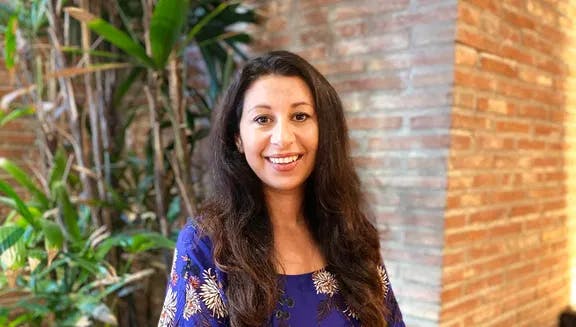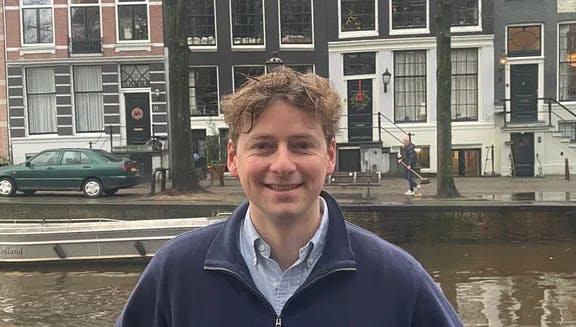#FoundersFridays: Meet Michael Musandu

#FoundersFridays is a StartupAmsterdam interview series: for entrepreneurs, by entrepreneurs. Each hero answers questions on their entrepreneurial journey, their learnings, milestones and bottlenecks, as well as on Amsterdam and the Dutch startup scene. It’s a platform for entrepreneurs to speak their minds freely and pass on their learnings to anyone who’s thinking about founding a startup as well.
This week we spoke to Michael Musandu, the co-founder of Lalaland. Lalaland uses AI to create synthetic, photo-realistic human avatars for eCommerce brands, enabling brands to showcase collections on diverse models which closely resemble their customers.
How did your career journey lead you to found Lalaland?
I was born in Zimbabwe and raised in South Africa, where I met my first love, technology. I started by building low-level expert systems in school. Inspired to learn more, I moved to the Netherlands to study computer science at the Vrije Universiteit in Amsterdam. There, I met Ugnius Rimša, who eventually became my co-founder. Next, I did a graduate program in Artificial Intelligence at Utrecht University. There I discovered generative adversarial networks: neural networks that capture variation within data-sets. I was curious to discover the opportunities for commercial use of such networks, which is why I joined Utrecht Inc. which supports young founders to transform projects into companies. I had already found a solution, but was in search of a problem we could solve with our technology. Here is where my third partner in crime comes in: Harold Smeeman. We met during our incubation program and discovered that we both felt severely underrepresented when shopping online as black and plus-size consumers. How do these garments actually look on and fit people like us? And that’s how Lalaland was born - out of a wish to diversify the web and solve the problem of people feeling underrepresented online.

Why did you choose Amsterdam to start and grow your business?
We owe a lot of our success to the Amsterdam startup ecosystem. I would summarise it in one word: brilliant. Being based in Amsterdam is one of the best things we ever did. It's an extremely vibrant and alive ecosystem, which offers countless opportunities for tech startups. To give an example, an office space is far more than a place to work. We’re currently housed at World Fashion Centre, before that at Startup Village and HNK. These parties have been an immense help, giving us access to a vast network of people. Many of the first customers we closed on came from someone saying “yeah we know someone who works there, maybe I can give you an intro”.
Likewise, ACE Incubator allowed us to radically expand our network of mentors and advisors, a versatile set of individuals ranging from in-depth technical experts to commercial gurus with excellent track records. When there’s a ‘click’, your mentor might turn into an angel investor or join your advisory board, bringing along their vast network. They say it's like a cheat sheet to the market, and it's so true. There's a whole structure of advisors, legal help and things like this, which really allows you to growth hack your business.
Lastly, strong access to capital also makes it a powerful ecosystem. ACE created a lot of networking opportunities to meet investors during fundraising. There is a wide range of private and public funding sources, as our past funding rounds with ASIF Ventures, Innovatie Fund Nord Holland and a group of Amsterdam-based investors have shown.
How are you approaching diversity and inclusion as you build your team?
To me, the most important metric is building an inclusive company culture. People often underestimate that diversity and inclusion efforts make everyone in your company happier, more productive and committed. To give an example, we make it an absolute priority to have a high eNPS score. We proactively create an environment where people with diverse experiences and backgrounds can bring their unique perspectives and skill sets to the office. We make sure that you feel valued and heard.
Secondly, we are conscious of who we hire and what additional knowledge they can bring to the table. Our product is inherently linked to building a more inclusive e-commerce fashion industry - hopefully to be scaled to a more inclusive web in general one day - so we need people with diverse genders, nationalities, ethnicities, body sizes and experiences to co-create.
Thirdly, we try to foster an environment where we are open to learning new things and introducing practices that make everyone feel equally included and heard - may that be the use of non-gendered pronouns or the regular sharing of our cultural rituals.
What’s the most valuable piece of advice you’ve been given?
“Listen to what is being said, who is saying it and why they are saying it”. To me, the ability to listen consciously is part of our recipe for success. The idea is not just listening to what someone is saying to give a response. People often try to win an argument, instead of using their emotional intelligence to understand why someone is saying something and where it actually comes from. You need to have an appetite to keep learning from others and be analytical.
Secondly, someone once told me that you don’t build a business, you build people - and then those people build the business. In other words, you are often building a social enterprise and not just a profit-making organism. If you want to fundamentally change society as an entrepreneur, you need to start from within your organisation. You need to break it, then you can remould the pieces into your vision and build a new one from within.
What has been a recent “win” for your business?
Launching with several fashion brands, and just to mention one: Wehkamp, one of the largest resellers in Amsterdam. We are honored to be working with a party that has such a wide reach, allowing our product to positively impact many customers. We are super excited to empower more brands to have diverse models and can’t wait to see more collections come online in the coming months.
Related articles

#FoundersFridays: Meet Bibi Schmidt

#FoundersFridays: Meet Layla Li

#FoundersFridays: Meet Svetlana Kordumova

#FoundersFridays: Meet Alvise Sembenico

#FoundersFridays: Meet Peter-Paul de Leeuw

#FoundersFridays: Meet Nancy Shenouda

#FoundersFridays: Meet Joris Oudejans

#FoundersFridays: Meet Benjamin Webster

#FoundersFridays: Meet Jurriaan Vollebregt
